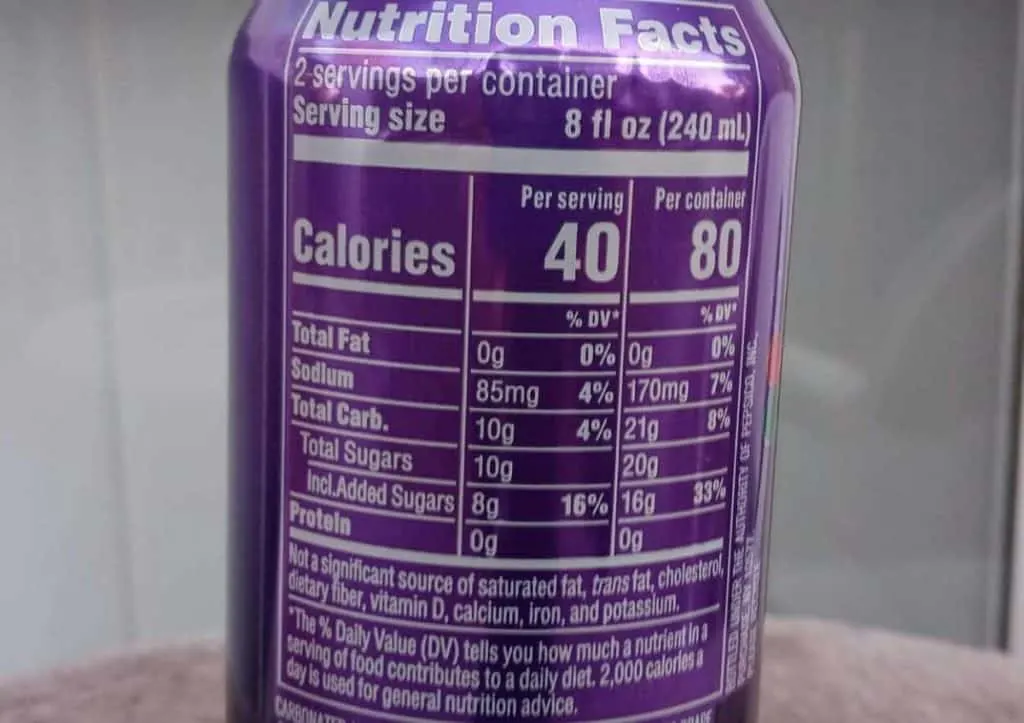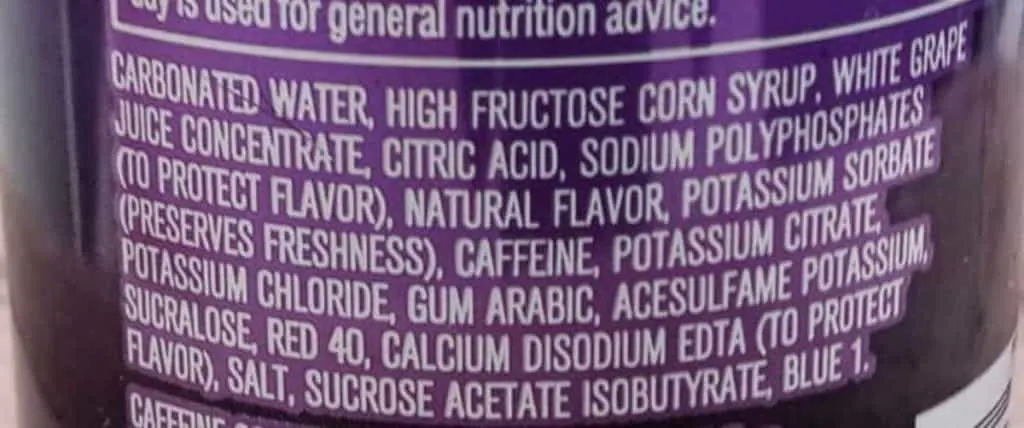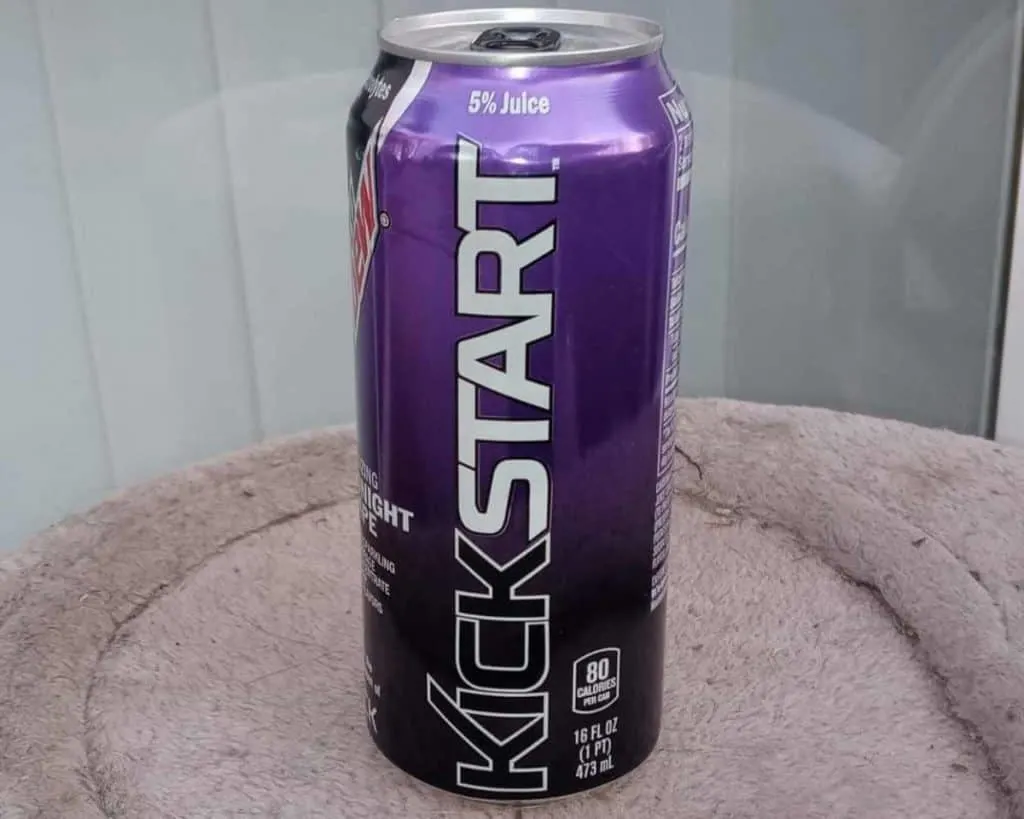There’s no denying that Mountain Dew Kickstart offers plenty of benefits for an energy drink with a moderate amount of just 90mg caffeine. Plus, it still maintains the great classic taste of the original soda.
But, is Mountain Dew Kickstart bad for you?
I won’t keep you guessing for long, so in brief, Mountain Dew Kickstart isn’t bad for you, provided you have it in moderation and keep yourself healthy. That said, I personally recommend having it only when you really need an energy booster.
But of course, it’s a little more complex than that.
So let’s break it down so that you’ll know more about how Mountain Dew Kickstart affects you in the more detailed discussion below.
Contents
Mountain Dew Kickstart Nutritional Facts
To get started, let’s see how Mountain Dew Kickstart compares to other energy drink brands shown in the table below:
| Typical Value (Standard Serving) | Mountain Dew Kickstart (16 fl.oz) | Game Fuel (16 fl.oz) | AMP Energy (16 fl.oz) |
| Energy | 80 Calories | 90 Calories | 220 Calories |
| Protein | 0g | 0g | 0g |
| Fat (Of Which Saturated) | 0g (0g) | 0g (0g) | 0g (0g) |
| Carbohydrate (Of which Sugars) | 21g (20g) | 24g (23g) | 58g (58g) |
| Sodium | 170mg | – | 142mg |
| Caffeine | 90mg | 90mg | 142mg |
| Vitamin A | – | 180μg | – |
| Vitamin B2 (Riboflavin) | – | – | 0.7mg |
| Vitamin B3 (Niacin) | – | 6.4mg | 4mg |
| Vitamin B5 (Pantothenic Acid) | – | 1mg | 2mg |
| Vitamin B6 | – | 0.7mg | 0.3mg |
| Vitamin B12 | – | – | 1.2μg |

Mountain Dew Kickstart Calorie Content
Each 16 fl.oz can of Mountain Dew Kickstart contains 80 calories, which is a pretty average amount for an energy drink.
Compared to its rivals Red bull and Monster that contain 110 and 190 calories, respectively, Mountain Dew Kickstart shows promising signs of being an energy drink that can complement your diet plan.
For reference, the recommended calorie intake is between 2,000 to 2,500 calories a day. Of course, other factors such as age, weight and overall lifestyle plays a role in determining your daily calorific intake.
That said, if you have a relatively healthy lifestyle with no pre-existing medical conditions, I think having a single can of Mountain Dew Kickstart won’t take up so much space in your daily limit.
However, it’s also best to keep in mind that although Mountain Dew Kickstart has a modest amount of calories, it’ll be just as easy to tip over your daily limit, especially if you don’t control yourself.
To add on, you also shouldn’t use this drink, or any other energy drink, as a meal replacement because your body runs on nutrients that come from regular foods.
Thus, I highly suggest having Mountain Dew Kickstart only when you need spurge of energy and don’t forget to have proper meals.
Mountain Dew Kickstart Ingredients
Every 16fl.oz can of Mountain Dew Kickstart contains:
- Carbonated Water
- High fructose corn syrup
- White grape juice concentrate
- Citric acid
- Sodium polyphosphates (Preservative)
- Natural flavour
- Potassium sorbate (Preservative)
- Caffeine
- Potassium citrate
- Potassium chloride
- Gum Arabic
- Acesulfame potassium (Artificial Sweetener)
- Sucralose (Artificial Sweetener)
- Red 40 (Colouring)
- Calcium disodium EDTA
- Sucrose acetate isobutyrate
- Salt
- Blue 1 (Colouring)

How Much Caffeine Is In A Can Of Mountain Dew Kickstart?
Mountain Dew Kickstart comes with an ideal amount of 90mg caffeine per 16 fl.oz can, but it also boils down to your caffeine metabolism.
The 90mg of caffeine in Mountain Dew Kickstart places the energy drink on the safer side of the spectrum, especially when you’re comparing it to other energy drinks that have as much as 300mg of caffeine in a single can.
I usually opt for caffeine below 100mg as I find anything above that range will make me feel a bit fidgety with a hint of cold sweats. That’s why even if Mountain Dew has moderate caffeine content, it still needs to be taken with caution.
For guidance, the FDA states that healthy adults shouldn’t have more than 400mg of caffeine per day. Going above the daily limit may lead to some serious side effects such as:
- Restlessness and shakiness
- Dizziness
- Headaches
- Dehydration
- Anxiety
In general, excessive caffeine consumption will bring more bad than good regardless of whether you have a high caffeine tolerance or not.
Although it’s unlikely that you’ll end up with a caffeine overdose when you drink Mountain Dew Kickstart, it’s still best to drink it in moderation and not go over your personal limits.
If you’re interested to know more about how caffeine affects your health, check out the insightful video below:
How Much Sugar Does Mountain Dew Kickstart Have?
A 16 fl.oz can of Mountain Dew Kickstart has 20g of sugar. Given that it’s a lesser amount compared to other sugar energy drinks, it still poses a threat if consumed excessively.
In fact, the AHA recommends that healthy daily sugar consumption is no more than 25g for women and 36g for men.
While Mountain Dew Kickstart may seem like the healthier choice of energy drink, I strongly advise not to have this drink regularly. Even a single can of it already affects your daily sugar intake, especially if you’re a woman.
Thus, excessive consumption of sugar may in turn bring in health risks like:
- Acne
- Weight gain
- Diabetes
- High blood pressure
- Cardiovascular disease
In my opinion, you should be made well aware that a single serving of Mountain Dew Kickstart is more than enough to give the right amount of boost for when you’re feeling fatigued.
It’s also always a good idea to check in with your doctor if you’re still unsure how Mountain Dew Kickstart can affect your regular diet.
Does Mountain Dew Kickstart Contain Artificial Sweeteners?
Besides regular sugar, Mountain Dew Kickstart also contains artificial sweeteners, which are sucralose, acesulfame potassium and high fructose corn syrup (HFCS).
Artificial sweeteners are commonly used as a sugar substitute because they contain zero calories, so you’ll surely get to satisfy your sweet tooth without feeling guilty.
Sucralose is known to be 400-700 sweeter than regular sugar, whereas the acesulfame potassium, also known as K or Ace-K, is said to be about 200 times sweeter.
While some people think that Sucralose can be an alternative to sugar, excessively consuming it may lead to harmful effects such as:
- Raise blood sugar and insulin levels
- Damage the metabolic processes of the body
- Possible side effects include diarrhoea, bloating, gas, or laxative effect
There are also concerns about acesulfame potassium as overconsumption may cause health problems such as depression, anxiety, and migraines.
Another sweetener found in Mountain Dew Kickstart is high fructose corn syrup (HFCS), and it’s usually added in processed food and sodas.
Like sucralose and acesulfame potassium, studies have found that HFCS may be more harmful than table sugar. Excessively consuming it poses a higher risk of metabolic syndrome, diabetes and obesity.

I personally think the use of both sugar and artificial sweetener in Mountain Dew Kickstart to be unnecessary and unhealthy.
So while these sweeteners won’t leave a dent in your daily calorie intake, I strongly advise you to keep your consumption to a minimum for the sake of your long-term health.
Mountain Dew Kickstart Vs Mountain Dew AMP Energy
I think both energy drinks have their pros and cons but, Mountain Dew Kickstart definitely leans more towards the healthier side, considering that AMP Energy has a higher caffeine and calorie content.
A single can of AMP Energy contains up to 142mg of caffeine, whereas Mountain Dew Kickstart only has 90mg of caffeine. If you’re sensitive to caffeine like me, I personally suggest you go for Kickstart.
That said, AMP Energy may also not be healthy for you if you’re on a low-carb diet because it contains a whopping 220 calories. A regular can of Mountain Dew Kickstart has 80 calories, which is a lot lesser.
Generally speaking, a high-calorie diet without a regular exercise routine can result in obesity. So, you may want to think about all that added calories you’ll be having when you drink a can of AMP Energy before including it into your diet.
Thus, I think Mountain Dew Kickstart is better than AMP Energy in terms of health-wise.
So, Is Mountain Dew Kickstart Bad For You?
Mountain Dew Kickstart isn’t bad for you as long as you practice a healthy lifestyle and be mindful of your daily caffeine and sugar intake. Though, I don’t recommend having this energy drink regularly.
| Mountain Dew Kickstart (16 fl.oz) | Daily Limit | |
| Caffeine | 90mg | 400mg |
| Sugar | 20g | 25g for women / 36g for men |
While one can of Mountain Dew Kickstart wouldn’t put you over the daily caffeine limit of 400mg, I don’t recommend having more than one can a day if you have a low caffeine tolerance.
Moreover, multiple cans of Mountain Dew Kickstart will definitely put your health at risk considering it has a high sugar content of 20g per serving. I think it’s not worth it to have all that extra sugar and calories piling up in your body.
That said, a sugary energy drink like this will most likely leave you with an unnecessary sugar crash once the effect wears off. When this happens, you’ll feel lethargic and tired due to the sudden drop in blood levels.
Also, I strongly advise you to avoid Mountain Dew Kickstart if you’re under 18 years old, pregnant, nursing or have medical conditions like diabetes.
All in all, if you’re only having it casually while also keeping yourself healthy, I’d say Mountain Dew Kickstart would complement your diet plan. But of course, you can always consult a nutritionist for a conclusive answer.
How Many Cans Of Mountain Dew Kickstart Can You Drink In A Day?
I recommend only drinking one can of Mountain Dew Kickstart a day.
If you plan to have Mountain Dew Kickstart regularly, I think it’s best to limit yourself to only one can a day.
Indeed, one can of Mountain Dew Kickstart only contain 90mg of caffeine, hence two cans will still keep you under the daily caffeine limit.
But the major downside to this drink is that it contains lots of sugar in a single serving, so if you have two cans a day, that’s double the sugar content. Two cans of Mountain Dew Kickstart is equivalent to 40g of sugar, which is way over the daily sugar limit.
That said, you should always be mindful that overconsumption of caffeine and sugar can bring about health complications. That’s why if I were you, I’d keep my daily intake of Mountain Dew Kickstart to only one can.
Plus, if you find yourself still craving an energy boost, you can always opt for other caffeinated beverages with lesser sugar content, like herbal teas.
Are Mountain Dew Kickstart healthy?
Mountain Dew Kickstart is an energy-boosting beverage that contains a lot of sugar and calories. Nonetheless, this also contains caffeine, taurine, and B vitamins. Mountain Dew Kickstart is not inherently bad, but it is not the healthiest either. In fact, there are much better alternatives to consider if you want a healthy energy drink.
Mountain Dew Kickstart Flavors
Here’s a quick list of 9 assorted flavors from Mountain Dew Kickstart:
- Original Dew
- Orange Citrus
- Black Cherry
- Midnight Grape
- Fruit Punch
- Mango Lime
- Pineapple Orange Mango
- Blueberry Pomegranate
- Raspberry Citrus
If you’re interested in a review of these flavors and a history of Mountain Dew’s various forays into the energy drink market, have a look at the video below:
Is Mountain Dew Kickstart better than other energy drinks?
An occasional can of Mountain Dew Kickstart is not going to cause urgent health problems that need a visit to the emergency room. Like any caffeinated beverage, it should be used with caution, but I wouldn’t go so far as to state that this energy drink is any better than the competition.
While calories, caffeine, and sugar content in Mountain Dew Kickstart are around average, Mountain Dew Kickstart is only effective as a morning beverage, because of its low caffeine content limits.
My Verdict On Mountain Dew Kickstart

In conclusion, Mountain Dew Kickstart does a pretty good job for an energy drink and you’ll definitely benefit from it as long as you’re healthy and control your daily consumption.
If you’re curious about whether Mountain Dew Kickstart is vegan-friendly, head on over to my other article, where I’ve written a more in-depth analysis on the topic.
I hope you found this article useful and enjoy kickstart-ting your day!
